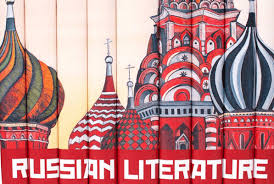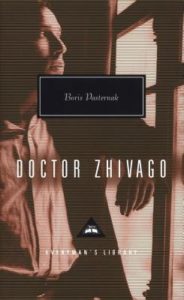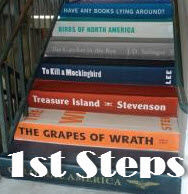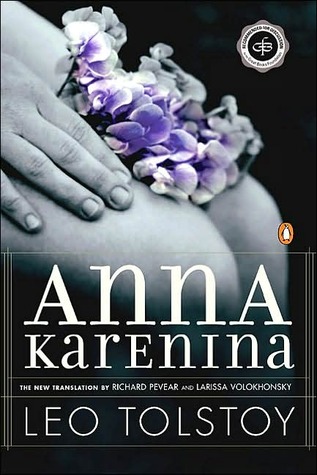 I am not entirely sure where my interest in Russian literature came from. I think it started with a fascination with the Cold War, which lead to a desire to understand the complex nature of the Soviet Union, both its politics and the people. The first Russian novel I read was Anna Karenina by Leo Tolstoy, however my obsession with Russian literature came soon after. When I first became a reader I was using the 1001 Books You Must Read before You Die list as a guide to work out what to read. While I would love to complete the full list, it has served its purpose, which was to expose me to good literature in all genres, allowing me to find where my literary tastes lie.
I am not entirely sure where my interest in Russian literature came from. I think it started with a fascination with the Cold War, which lead to a desire to understand the complex nature of the Soviet Union, both its politics and the people. The first Russian novel I read was Anna Karenina by Leo Tolstoy, however my obsession with Russian literature came soon after. When I first became a reader I was using the 1001 Books You Must Read before You Die list as a guide to work out what to read. While I would love to complete the full list, it has served its purpose, which was to expose me to good literature in all genres, allowing me to find where my literary tastes lie.
My Russian literature obsession grew from my interest in satire, beginning with Super Sad True Love Story by Gary Shteyngart, which is a dystopian tale of globalisation. However under all that, it is an autobiographical novel of a Russian immigrant. I loved discovering the story underneath the plot, and I quickly discovered that Russian literature was a treasure trove for that. Russia has a very complex history; this is often reflected in its literature and makes it a big part of Russian culture.
Just a brief history on Russian literature, which has its roots in Chivalric romance, epics and chronicles on the Russian life. It is here at its roots where we establish the importance of irony and satire in the literature. It was Peter the Great’s efforts to modernise Russia that gave way to Russian literature in the 18th century. While I have not read any of these authors from this time, authors like Antiokh Kantemir and Vasily Trediakovsky were notable contributors to its literature. The 19th century is the golden age for Russian literature with Nikolai Gogol, Fyodor Dostoevsky, Anton Chekov, Ivan Turgenev and Leo Tolstoy creating some of Russia’s greatest pieces of literature. It was also where the literary movement Russian Romanticism was established, which explores metaphysical discontent with society and self, from notable authors like Alexander Pushkin and Mikhail Lermontov. The silver age in the beginning of the 20th century was focused around poetry and the avant-garde. Poets often associated with the silver age include Marina Tsvetaeva and Boris Pasternak.
This was then followed by the Soviet era, which was the rise of Socialist realism, Russian formalism and futurism. While the Soviet era was an extremely complex period for literature, and covers so many different literary styles, it is easier to put all of the work from the Soviet Era together. If you want to break out the soviet era, you could do that by Samizdat, Tamizdat and Gosizdat. Samizdat ‘self-published’ is the distribution of literature illegally published (often by carbon copies of typescripts) and distributed among other Russians. This is similar to a method used in the Tsarist era, and allowed uncensored literature by authors like Mikhail Bulgakov and Aleksandr Solzhenitsyn to reach an audience. Tamizdat ‘over there’ is when a soviet writer has their works published in the West because they could not publish in Russia. Most Soviet authors had to rely on this method to have their works published, most notable example of Tamizdat is Boris Pasternak’s Doctor Zhivago. Gosizdat ‘State publisher’ was the term used for officially sanctioned publications. In all honesty, I cannot think of a single modern classic from the Soviet Era that was published originally by the state. Although the Russian literature magazines where many works were first published would have been state run.
The post-Soviet era covers all literature published after the collapse of the USSR. Although the censorship of the soviet era was officially lifted, writers still approached sensitive subjects in a similar fashion. In part by the political/economic chaos of the post-Soviet era and partly to follow the traditions of great Russian literature. Although authors like Boris Akunin enjoy huge success in popular fiction, writing a historical detective series. This does not include the authors that fled Russia or the Soviet Union and became authors after gaining citizenship elsewhere, such as Ayn Rand, Isaac Asimov, and Vladimir Nabokov.
While there is a rich history of Russian literature, often there are common themes that appear throughout the ages. Most notably is the struggle for stability; Russian history has been a whirlwind of war and tyranny. This struggle often translates as redemption through suffering. This could be a struggle with religion, philosophy, society or even one’s self. That struggle can be seen in novels ranging from the likes of The Brothers Karamazov to Vladimir Sorokin’s 2006 science fiction novel Day of the Oprichnik. Although my wife might agree with Russian literary critic Viktor Shklovsky, who said “Russian literature is devoted to the description of unsuccessful love affairs.”
Authors within Russia often fall into the social class (I don’t think I need to explain the role class plays in Russia) known as the intelligentsia. This class of intellects are tasked to guide or critique society’s culture and politics. This is why Russian literature plays such a huge role in Russian culture, and also explains why literature was so controlled in the Soviet era. Union of Soviet Writers was formed by Stalin to control the field of literature in the USSR. Membership was not mandatory but if an author was not a member, they would have very limited opportunities for publication. Despite their best efforts, thankfully we still have a rich selection of Soviet literature critiquing the culture and politics of the time.
In both Tsarist Russia and the Soviet Union, authors had to be careful of what they said, many were exiled to a labour camp for what they wrote. So literary devices were often deployed to say what needed to be said in a more creative way. Literary devices often found in Russian literature include metaphors, allegories, irony, satire and even propaganda to express the author’s views. Which is why many Russian classics are very philosophical or political in nature. It is the dangerous writing that seems to have stood the test of time.
There is so much to offer in Russian literature, I know I have so much I need to learn and read but I am excited about the prospects. I find it sad when I see “Russian novel” used as shorthand for lengthy or turgid; I never understood that. While War and Peace is often considered a challenging book due to its length, there is a reason why it is considered a masterpiece. I would love to gain some recommendations on Russian literature I should check out. My personal favourites include Crime and Punishment by Fyodor Dostoevsky, The Master and Margarita by Mikhail Bulgakov and for something really weird, Day of the Oprichnik by Vladimir Sorokin.


 Title: Dr Zhivago (
Title: Dr Zhivago (



 Anna Karenina by Leo Tolstoy
Anna Karenina by Leo Tolstoy Crime and Punishment by Fyodor Dostoyevsky
Crime and Punishment by Fyodor Dostoyevsky